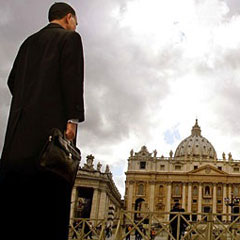Several days ago, I resolved to cite studies which demonstrate there is no causal link between celibacy and sexual abuse.
I’ve changed my mind. The John Jay Report, which is by no means definitive but certainly authoritative, is freely available online, and there is data cited there. The ensuing discussion has raised more interesting points, I think.
Archbishop Fisher, in his public response to last week’s headlines, reiterated the Church’s commitment to clerical celibacy, and commented on a more important cause and remedy:
The Church is now addressing the psycho-sexual development of its personnel directly and giving much more attention to healthy relationships.
But it is a comment which was made on this blog which has really demanded my attention, and provoked my thinking.
The real issue is not celibacy – it is the psychosexual formation provided to seminarians and priests (see the TJHC report, pg. 23). Theologically, celibacy is not a natural vocation – it is supernatural – and therefore requires concerted and consistent efforts to orient the person to the supernatural motivations for celibacy, and to help the person integrate these into their daily living. This requires the intentional development of a congruent culture within seminaries and groups of clergy.
Psychosexual formation cannot possibly be adequately achieved by irregular seminars presented in group settings, for example. Rather, it requires that each seminarian and priest have a personalised relationship with both a spiritual director and a qualified clinical psychologist. That only one seminary in Australia (to my knowledge – Good Shepherd, Sydney) has a clinical psychologist permanently on staff indicates that the majority of bishops still do not understand what is required for the adequate formation of seminarians and priests.
These are compelling points I think. I’d add a few more.
As a seminarian, I was accountable. I was expected to regularly consult a spiritual director. I met with seminary formators to discuss pastoral and academic performance. If I didn’t do this, my lapses were queried and addressed.
But the moment I left the seminary, all these requirements evaporated. I happen to belong to a priestly society which does keep me accountable. I meet with a mentor regularly. I’m expected to frequent sacramental confession and spiritual direction. I’m obliged to make myself available for regular ongoing formation.
I also happen to work with a parish priest who extols oversight and regular debriefing. When we lived in the same presbytery, we would share at least one meal every day. Now that I live an hour away, I meet him in a formal capacity fortnightly, but I’m also encouraged to call him as the need arises. He also schedules periodic reviews.
But all of this is accidental, in the sense that it is neither typical nor obligatory. Why not? The principals and teachers in our Catholic education system undergo regular reviews which facilitates best practice, professional development, and pastoral support.
I honestly can’t understand why priests aren’t subjected to something similar. Maybe there’s a fear that priesthood will be reduced to a professional class. Or maybe it related to the well-founded weariness at bureaucracy. (That’s another post!)
Nonetheless, priestly fidelity is hard work, and it can be emotionally desolate. It doesn’t have to be. It shouldn’t be. In my case it isn’t — thanks to God’s grace, to my fidelity to prayer, and to the care and oversight I receive from the Priestly Society of the Holy Cross, the Australian Confraternity of Catholic Clergy, and from my parish priest.
Should every seminarian and priest have a personalised relationship with a clinical psychologist? Should every priest receive professional oversight?
I haven’t formulated answers to these questions, but I certainly think they’re worth discussing. These are issues which I’d like to see on the table.






Thanks for being a faithful and orthodox priest Fr John.